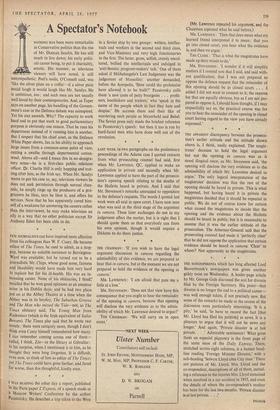A Spectator's Notebook
NOTHING HAS been more remarkable in Conservative politics than the rise of Mr. Duncan SandYs. He has still much to live down; his early politi- cal career being, to put it charitably, erratic. His manner, as television viewers will have noted, is still unsympathetic; Peel's smile, O'Connell said, was 'like the silver plate on a coffin'—if a silver plate could laugh it would laugh like Mr. Sandys. He is ambitious, too : and such men are not usually well loved by their contemporaries. And, as Taper says on another page, his handling of the Govern- ment's case in the Defence debate was uninspired. Yet his star ascends. Why? The capacity to work hard and to put that work to good parliamentary purpose is obviously one reason. That he runs his department instead of it running him is another. But I suspect that his chief asset, as the Defence White Paper shows, lies in his ability to approach large issues from a common-sense point of view, cutting a swathe through departmental cotton- wool. Above all—and I mean this in no denigra- tory sense—he is a first-class public relations officer. Dr. Charlie Hill is only hopping and trot- ting after him, as the Irish say. When Mr. Sandys wants to put his case to, say, television viewers he does not seek permission through normal chan- nels; he simply rings up the producers of a pro- gramme he likes, says he likes it, and offers his services. Now that he has apparently cured him- self of a weakness for answering the camera rather than the interviewer, he may make television an ally in a way that no other politician except Sir Anthony Eden has been able to do.






























 Previous page
Previous page